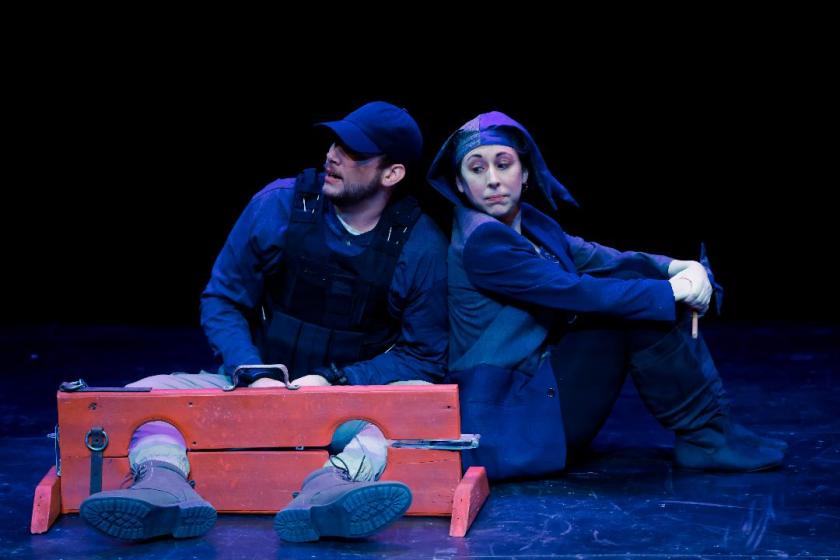
Frederick Manion has murdered Barney, owner of a cocktail bar. He found him and shot him dead. His wife, Laura, returned home, black and blue, clothes torn, and told her husband she’d been raped. Manion, a decorated soldier, turns himself in. Paul Biegler, a retired District Attorney, is enlisted to defend Manion, with the help of his buddy, (tipsy attorney) Parnell McCarthy. Biegler visits Manion in jail, a contentious defendant.
Anatomy of a Murder is a novel written by John D. Volker, adapted for the stage by playwright Elihu Winer. Volker was the actual lawyer who defended the case. Otto Preminger’s intense, sardonic film, preceded the play, starring Lee Remick, Ben Gazzara, James Stewart, George C. Scott, and Eve Arden, et al. Curiously, the play eliminated certain elements, probably for practical reasons. Now nobody expects (except perhaps Disney) for a show to hop between incarnations identically. It’s not always easy to tell the difference between concoction and elimination. That being said, I was surprised that one particular detail, brought up in Winer’s drama, was not pursued.
It should come as no surprise that the defendant’s innocence or guilt is irrelevant, at least to his defense. Paul Biegler says as much. Your attorney is your advocate in an adversarial process, designed for your best interest. If the verdict’s unjust, the onus lies with the prosecutor. This structure respects the presumption of innocence. Some attorneys say outright: Don’t tell me if you did it, I don’t want to know.
Anatomy of a Murder is a strange mixture of the lurid and the true. It’s an Exotic Dancer dressed like a Prima Ballerina. Biegler is perceived as truthteller, though he’s willing as any other lawyer to use chicanery. The law provides some latitude, at the discretion of the judge. Biegler draws the line at prevarication. He won’t lie. Laura Manion is displayed as the victim, while the prosecution suggests she was looking for sex. Naturally the time that Anatomy of a Murder was written, the laws concerning these questions were not enlightened.
None of the characters are well off. Biegler himself is scraping by. Frederick and Laura share a mobile home. It’s implied that he can be brutal when they fight. Biegler and McCarty get useful gossip from their secretary. It should be added this defense team of three are virtually working pro bono. Very little here is spelled out, the truth being messy and all. But it’s the sly Volker who plays on ambiguity. He emphasizes the doubtful, without being obvious. He exploits our inclination to say: Well, it might be true. And the ending is positively subversive.
Anatomy of a Murder, staged by Richardson Theatre Center, is distilled. Volker has 86’ed some peripheral subplots for the sake of clarity, though that might have gone to tone. The focus is the courtroom, which occupies most of the stage. Director Rachael Lindley handles this disturbing content with a savvy, careful touch. The impressive cast, is also equal to the task. Odd that such a harrowing story should feel so distant. It lurks in your brain until it seeps out later.
Richardson Theatre Centre presented Anatomy of a Murder. It played October 25th-November 10th, 2024. 518 West Arapaho Road, Suite 113. Richardson, Texas 75080. 972-699-1130. richardsontheatrecenter.net








